Unit 1 Could you please clean your room?SectionA3a-4c课件 +嵌入音频(共42张PPT)
文档属性
| 名称 | Unit 1 Could you please clean your room?SectionA3a-4c课件 +嵌入音频(共42张PPT) | 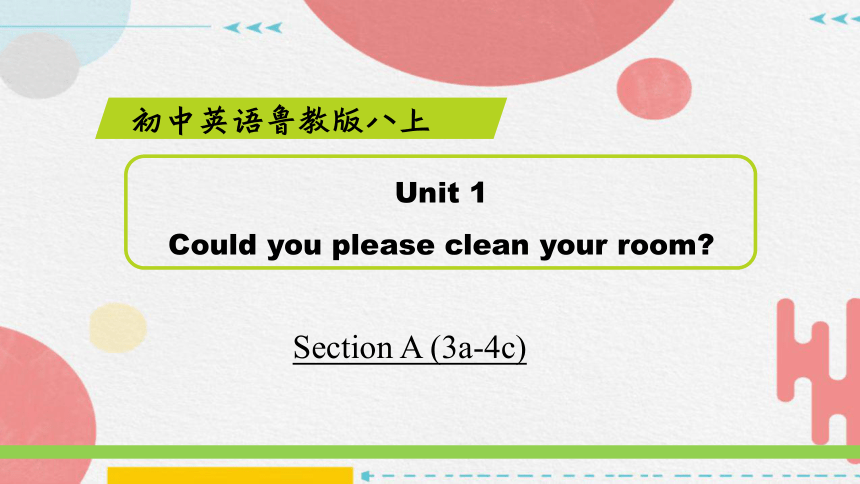 | |
| 格式 | pptx | ||
| 文件大小 | 9.2MB | ||
| 资源类型 | 教案 | ||
| 版本资源 | 鲁教版 | ||
| 科目 | 英语 | ||
| 更新时间 | 2023-11-17 15:55:55 | ||
图片预览


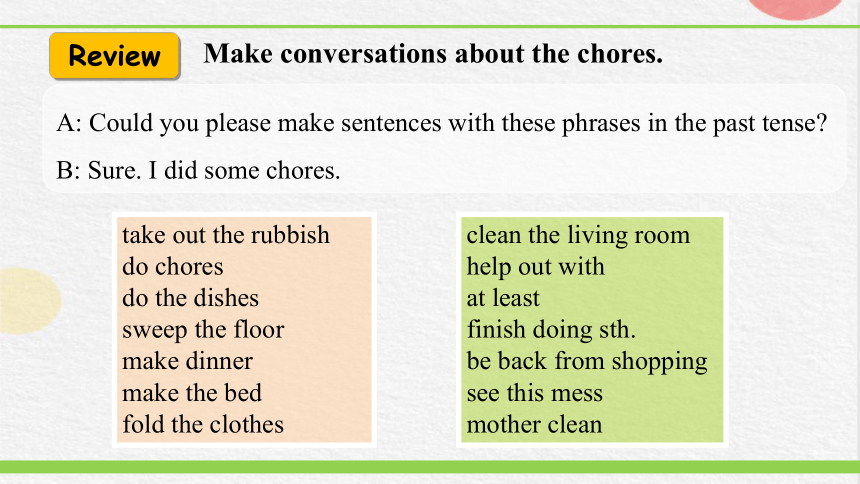
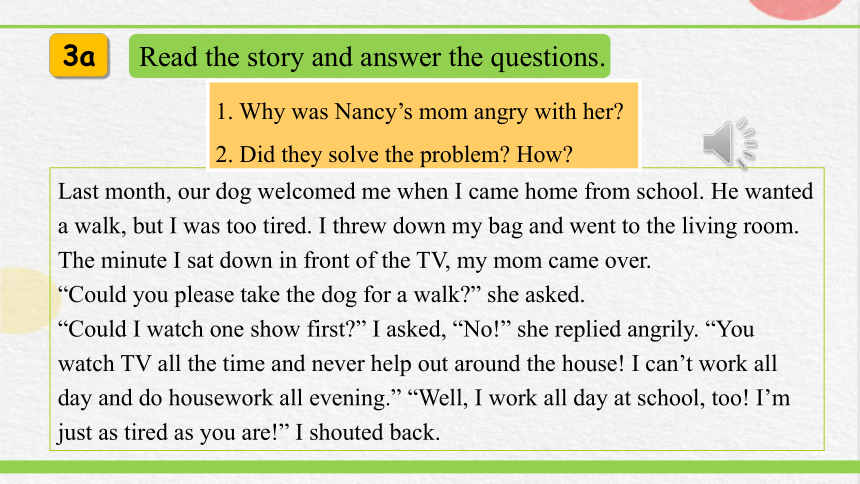
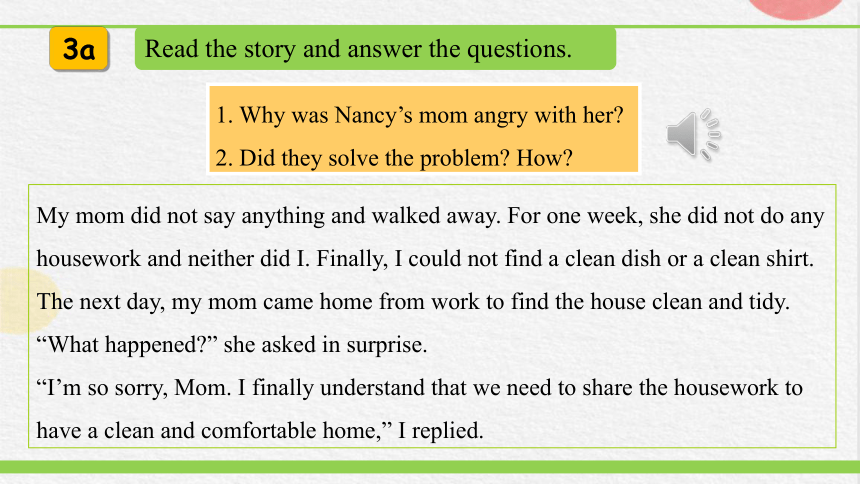
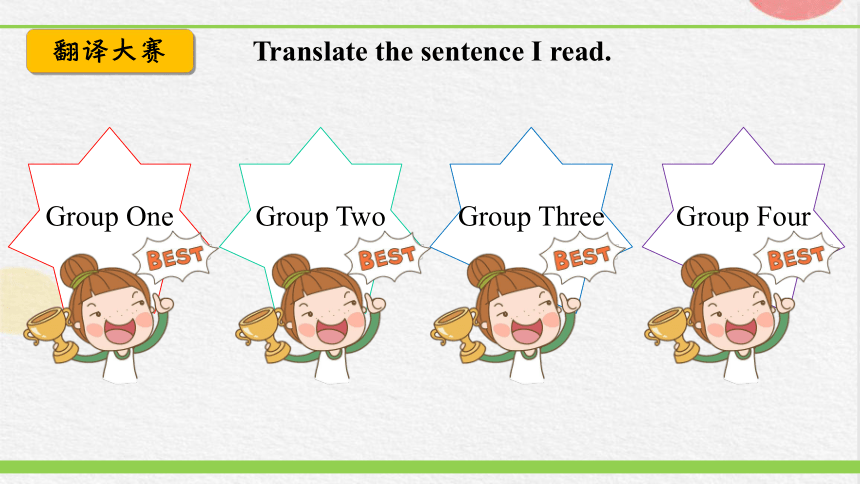
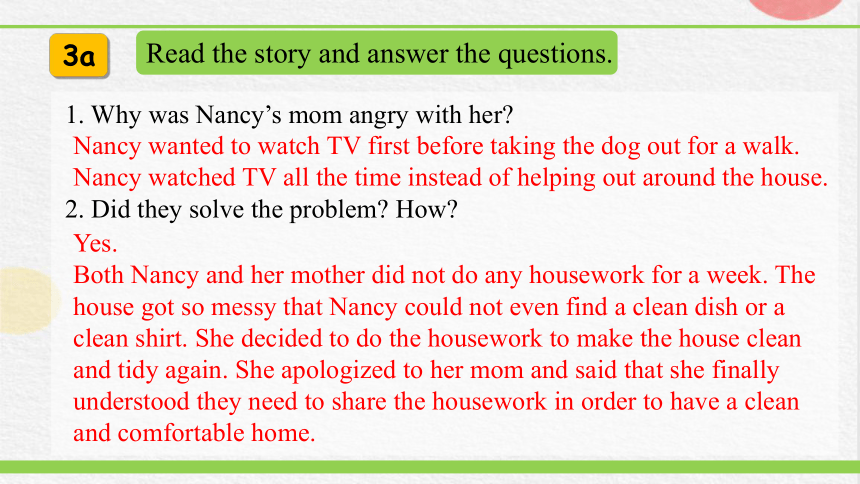
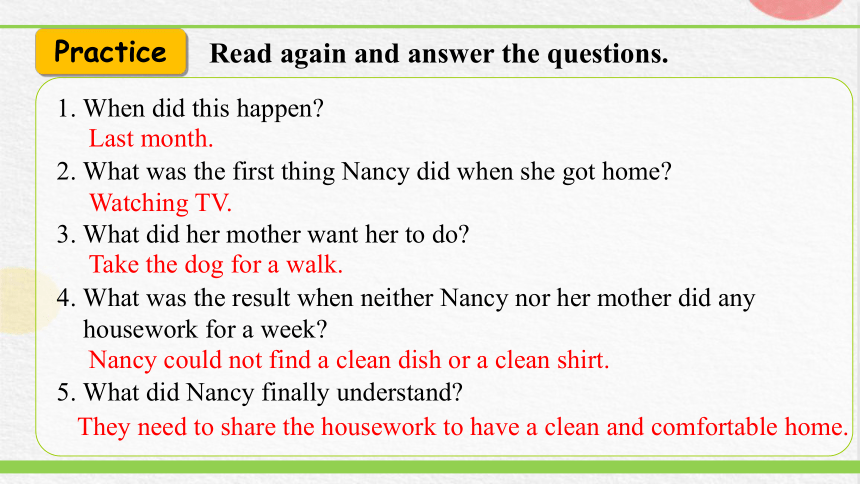
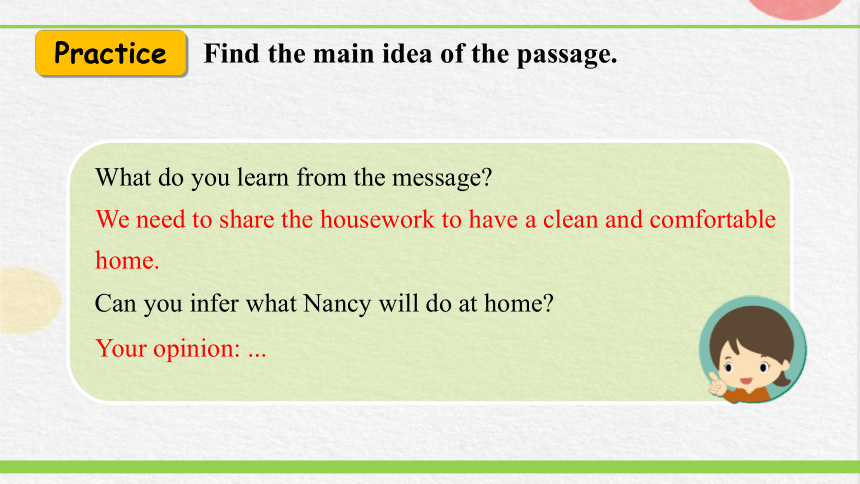
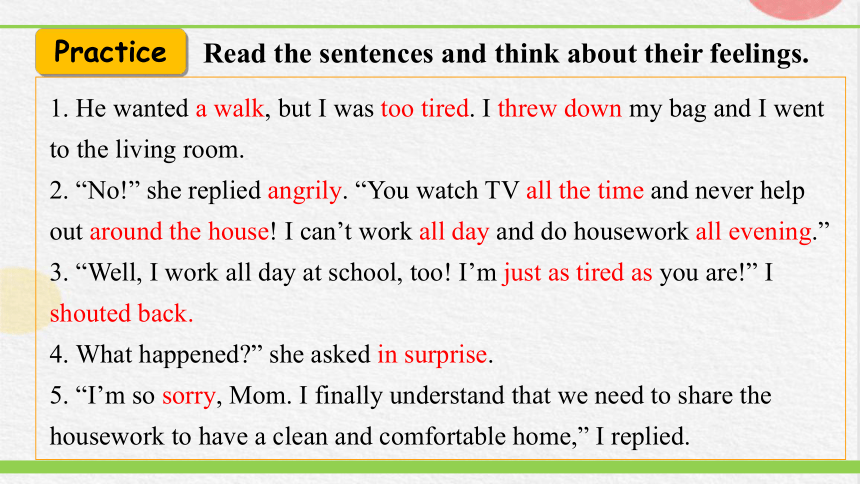
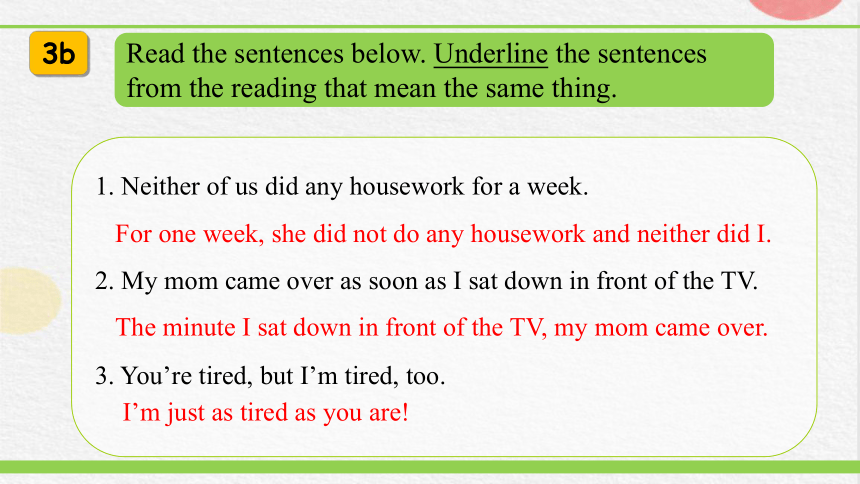
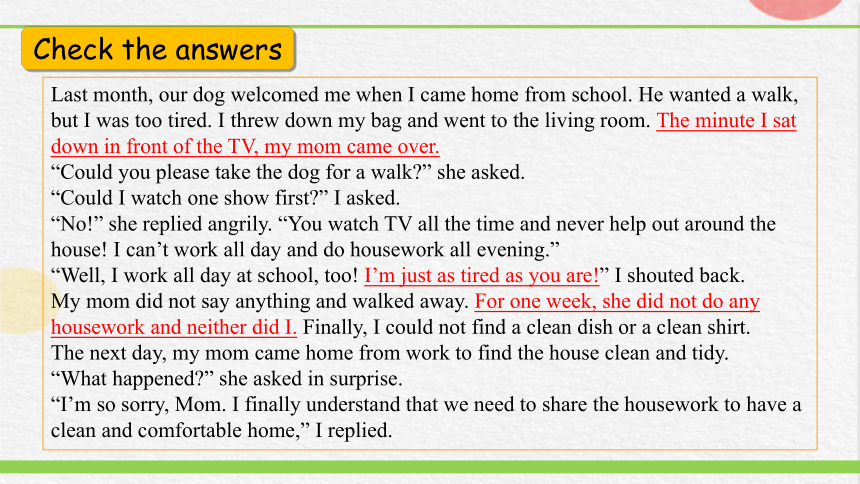
文档简介
(共42张PPT)
初中英语鲁教版八上
Unit 1
Could you please clean your room
Section A (3a-4c)
1. New vocabulary
last month, come over, take the dog for a walk, watch one show all the time, the next day, neither did I
2. Important sentences
The minute I sat down in front of the TV, my mom came over.
I’m just as tired as you are!
For one week, she did not do any housework, and neither did I.
3. We need to share the housework to have a clean and comfortable home.
take out the rubbish
do chores
do the dishes
sweep the floor
make dinner
make the bed
fold the clothes
A: Could you please make sentences with these phrases in the past tense
B: Sure. I did some chores.
clean the living room
help out with
at least
finish doing sth.
be back from shopping
see this mess
mother clean
Make conversations about the chores.
Review
Last month, our dog welcomed me when I came home from school. He wanted a walk, but I was too tired. I threw down my bag and went to the living room. The minute I sat down in front of the TV, my mom came over.
“Could you please take the dog for a walk ” she asked.
“Could I watch one show first ” I asked, “No!” she replied angrily. “You watch TV all the time and never help out around the house! I can’t work all day and do housework all evening.” “Well, I work all day at school, too! I’m just as tired as you are!” I shouted back.
1. Why was Nancy’s mom angry with her
2. Did they solve the problem How
Read the story and answer the questions.
3a
My mom did not say anything and walked away. For one week, she did not do any housework and neither did I. Finally, I could not find a clean dish or a clean shirt.
The next day, my mom came home from work to find the house clean and tidy.
“What happened ” she asked in surprise.
“I’m so sorry, Mom. I finally understand that we need to share the housework to have a clean and comfortable home,” I replied.
1. Why was Nancy’s mom angry with her
2. Did they solve the problem How
Read the story and answer the questions.
3a
翻译大赛
Translate the sentence I read.
Group One
Group Two
Group Three
Group Four
1. Why was Nancy’s mom angry with her
2. Did they solve the problem How
3a
Read the story and answer the questions.
Nancy wanted to watch TV first before taking the dog out for a walk. Nancy watched TV all the time instead of helping out around the house.
Yes.
Both Nancy and her mother did not do any housework for a week. The house got so messy that Nancy could not even find a clean dish or a clean shirt. She decided to do the housework to make the house clean and tidy again. She apologized to her mom and said that she finally understood they need to share the housework in order to have a clean and comfortable home.
1. When did this happen
2. What was the first thing Nancy did when she got home
3. What did her mother want her to do
4. What was the result when neither Nancy nor her mother did any
housework for a week
5. What did Nancy finally understand
Last month.
Watching TV.
Take the dog for a walk.
Read again and answer the questions.
Nancy could not find a clean dish or a clean shirt.
They need to share the housework to have a clean and comfortable home.
Practice
What do you learn from the message
Can you infer what Nancy will do at home
Find the main idea of the passage.
We need to share the housework to have a clean and comfortable home.
Your opinion: ...
Practice
1. He wanted a walk, but I was too tired. I threw down my bag and I went to the living room.
2. “No!” she replied angrily. “You watch TV all the time and never help out around the house! I can’t work all day and do housework all evening.”
3. “Well, I work all day at school, too! I’m just as tired as you are!” I shouted back.
4. What happened ” she asked in surprise.
5. “I’m so sorry, Mom. I finally understand that we need to share the housework to have a clean and comfortable home,” I replied.
Read the sentences and think about their feelings.
Practice
1. Neither of us did any housework for a week.
2. My mom came over as soon as I sat down in front of the TV.
3. You’re tired, but I’m tired, too.
Read the sentences below. Underline the sentences
from the reading that mean the same thing.
For one week, she did not do any housework and neither did I.
The minute I sat down in front of the TV, my mom came over.
I’m just as tired as you are!
3b
Last month, our dog welcomed me when I came home from school. He wanted a walk, but I was too tired. I threw down my bag and went to the living room. The minute I sat down in front of the TV, my mom came over.
“Could you please take the dog for a walk ” she asked.
“Could I watch one show first ” I asked.
“No!” she replied angrily. “You watch TV all the time and never help out around the house! I can’t work all day and do housework all evening.”
“Well, I work all day at school, too! I’m just as tired as you are!” I shouted back.
My mom did not say anything and walked away. For one week, she did not do any housework and neither did I. Finally, I could not find a clean dish or a clean shirt.
The next day, my mom came home from work to find the house clean and tidy.
“What happened ” she asked in surprise.
“I’m so sorry, Mom. I finally understand that we need to share the housework to have a clean and comfortable home,” I replied.
Check the answers
对某人生气
解决问题
放学(下班)学回家
想散步
扔下
去客厅(卧室)
走过来
be angry with sb.
solve the problem
come home from school (work)
want a walk
throw down
go to the living-room (bedroom)
come cover
短语总结
短语总结
带某人散步/去散步
一直;总是
家里家外
整个白天/晚上
做家务
大声回应
走开
take sb. for a walk/go for a walk
all the time
around the house
all day/all evening
do housework
shout (at sb.) back
walk away
没说什么
第二天
惊讶地
分担家务
一个干净又舒适的家
一……就……
用另外一种形式
not say anything
the next day
in surprise
share the housework
a clean and comfortable home
as soon as
in the other form
短语总结
1.当我放学回到家,我们的狗来迎接我。
Our dog welcomed me when I came home from school.
2.我扔下书包,来到客厅。
I threw down my bag and went to the living room.
3.我刚坐到电视前,妈妈就过来了。
The minute I sat down in front of the TV, my mom came over.
4.你一直在看电视,在家里从不帮忙。
You watch TV all the time and never help out around the house.
句子总结
句子总结
5.妈妈什么也没说,走开了。
My mom did not say anything and walked away.
6.我不能找到一个干净的盘子和一件干净的衬衫。
I couldn’t find a clean dish or a clean shirt.
7.妈妈下班回家发现屋子既干净又整洁。
My mom came back from work to find the house clean and tidy.
8.我们需要分担家务来保持一个干净而又舒适的家。
We need to share the housework to have a clean and comfortable home.
1. The minute I sat down in front of the TV, my mom came over.
the minute (that)为时间名词,表示“一……就……”,其后的 that 经常省略, minute前可以用 very 等形容词修饰,相当于as soon as。
常见的时间名词还有:the moment, instant, second等。
e.g. I’ll tell him the minute he comes.
I sent you the news the instant that I heard it.
I have to go to Dallas the moment the meeting finishes.
The second the bell rang, the students dashed out of the classroom.
Language Points
2. You watch TV all the time and ...
all the time(在该段时间内)一直;向来, 一向;时时刻刻;每时每刻,相当于always。
e.g. I do in this way all the time.
我一直是这么做的。
This happens all the time.
这种情况总是发生。
Language Points
3. I’m just as tired as you are!
(1) as ... as 意为 “和……一样” ,表示同级比较。使用时要注意第一个as为副词,第二个as为连词。
其基本结构为:as + adj./ adv.原级+ as。
e.g. This film is as interesting as that one.
这部电影和那部电影一样有趣。
Your pen writes as smoothly as mine.
你的钢笔写起来和我的一样流畅。
(2) as … as 的否定形式为 “not as/so + adj./adv.原级+ as”。
e.g. He didn’t act as/so well as you. 他表演得不如你好。
Language Points
4. For one week, she did not do any housework and neither did I.
(1) neither 用作副词,作“也不”解释,放在句首,表示前面否定的内容也适用于另一个人或物,句子须采用部分倒装:neither +系动词be/情态动词/助动词+主语。此时也可用nor替换 neither。
e.g. — I don’t like this dress. 我不喜欢这件连衣裙。
— Neither do I. 我也不喜欢。
— I’ve never been to Australia. 我从来没有去过澳大利亚。
— Neither have I. 我也没有。
He is not good at swimming, nor am I.
他不擅长游泳,我也不。
Language Points
(2) neither 用作代词,表示“两者都不,双方均不”。
e.g. He answered neither of the letters.
他两封信都没回。
— Which one would you like
— Neither.
——你喜欢哪一个?
——两个都不喜欢。
Language Points
5. “What happened ” she asked in surprise.
介词短语 in surprise 表示状态,意思是“吃惊地, 惊讶地”。
e.g. She looked at me in great surprise.
她极其惊讶地看着我。
【拓展】surprise的相关短语
(1) to one’s surprise或to the surprise of sb“使某人吃惊的是、出乎某人 意料”,常位于句首,作状语,表示行为的结果。
Language Points
(2) be surprised to do sth. 对做某事很惊讶。
e.g. I am surprised to learn that he is here. 听说他在这里,我很惊讶。
Jenny was surprised to see Peter in Paris.
在巴黎碰到彼得,让珍妮感到很意外。
(3) be surprised at “对……感到惊讶”。表示某种情绪、心情的起因, 常用… at这一介词短语。如:
We were surprised at his arrival.
The child was frightened at the noise.
The teacher was glad at our progress.
Language Points
1. Could you take the dog for a walk (noun) I walked home from school. (verb)
2. Could I watch one show first _________________________________________
3. I can’t work all day. _________________________________________________
4. You watch TV all the time. ___________________________________________
5. “What happened ” she asked in surprise._________________________________
Could you show me your new book (verb)
(noun)
Decide whether the underlined words in the sentences are verbs or nouns.
Then write another sentence using the underlined word in the other form.
(verb)
I have to do some work. (noun)
(verb)
Your new watch looks nice. (noun)
(noun)
You surprised me a lot. (verb)
3c
Could I go out for dinner with my friends Sure, that should be OK.
Could we get something to drink after the movie No, you can’t. You have a basketball game tomorrow.
Could you please take the dog for a walk OK, but I want to watch one show first.
Could you please take out the rubbish Yes, sure.
Grammar Focus
Could I/you (please) + 动词原形?表示委婉地提出请求。
1. —Could you please clean your room
—Yes, sure./ Of course./ Certainly./All right.
2. —Could you please do the dishes
—Sorry, I can’t. I have to do my homework.
Key sentence structures
肯定回答
否定回答
在表示请求帮助或请求允许的疑问句中,常用could代替can,以表示礼貌,委婉或不确定的语气,而can则不具备这些语气。这种情况下不能把could看作can的过去式。以上两句中用could是为了表示礼貌的请求。表示请求帮助或请求允许时,除了can, could之外,还可以用may,句子的表达方式也各有不同,可以用不同的方式来表示同一个概念。
语法聚焦
e.g. ① Could/Can/May I use your car for a day
② I wonder if I could use your car for a day
对于①、②句所作允答可以各种各样,如同意可以说Yes或Sure或Certainly,还可说Yes, (do) please. 或Of course. (you may/can). 或Go ahead, please. 或That’s OK/all right; 如果不同意,可以说I’m sorry you can’t. 或I’m really sorry, but I have to use it today. 要避免说No, you can’t. 这样显得很不礼貌。否定回答通常用委婉语气。
语法聚焦
e.g. ③ Do you mind if I use your car for a day
对于句③所作回答可以说Never mind. /Not at all. 表“不介意”。不能用Yes. /Sure. /Of course. /Certainly.等。无论肯定还是否定应答中,要避免使用could,要用can或may。因为应答须用确定的语气。而could在表请求的问句中是为了表示礼貌或委婉语气,用在应答中则成了不确定语气,与情理不符。所以应答中不说Yes, you could. 或No, you couldn’t. 而要说Yes, you can. 或Sorry. /No, you can’t.
语法聚焦
类似句型有:Would you like + sth. / to do sth.
May I + do sth.
Shall we + do sth.
Would you mind + sth. /doing sth.
What / How about + sth. /doing sth.
肯定回答:Sure. /Of course. / Certainly. /OK. /Great. / Well. /
Good idea. / I agree.
否定回答:Sorry… / No, you can’t.
语法聚焦
a. Yes, here you are.
b. Hmm. How much do you need
c. Yes, sure. No problem. I finished
reading it last night.
d. Yes, but don’t come back too late.
e. No, I can’t. I cut my finger and I’m
trying not to get it wet.
Write R for requests and P for permission. Then match each one
with the correct response.
1. ___ Could I hang out with my friends
after the movies
2. ___ Could you please pass me the salt
3. ___ Could I borrow that book
4. ___ Could you help me do the dishes
5. ___ Could you lend me some money
P
R
R
R
P
4a
a
d
c
e
b
★ borrow表示“借入”,即把本来不属于自己的东西借来暂时使用,常与介词from连用。
e.g. You can borrow a book from the library.
May I borrow your bike
我可以借用你的自行车吗?
★ lend表示“借出”,即把属于自己的东西借给别人暂时使用,常与介词to连用,也可以跟双宾语。
e.g. He’s going to lend his bike to Tom.
You mustn’t lend others my pen.
词义辨析
borrow和lend
Exercise
用borrow或lend的正确形式填空
1. He _________ a book from me, and never returned it.
2. Can I _________ your bicycle
3. Joe ________ this car to us for the weekend yesterday.
4. I __________ two books from the library.
5. English has __________ many words from French.
6. Can I __________ your car on Saturday
7. Can you _________ me $10
8. __________ me your car please.
borrowed
borrow
lent
borrowed
borrowed
borrow
lend
Lend
单项选择
1. I ______ some books from my friend and I ______ them to my cousin this morning.
A. lent; kept B. kept; lent C. lent; borrowed D. borrowed; lent
2. —Can I _______ your rubber — Sorry. Lily ______ it already.
A. lend; has lent B. borrow; has lent
C. lend; has borrowed D. borrow; has borrowed
3. —How long can she ______ the book
—Two weeks.
A. borrow B. lend C. keep D. return
D
D
C
keep表示状态,可与一段时间连用
Exercise
A: I hate to ____ chores.
B: Well, I hate some chores too, but I like other chores.
A: Really Great! _____ I ask you to ____ me with some chores then
B: What do you need help with
A: ______ you please _____ my clothes for me
B: I don’t want to do that! It’s boring!
A: OK. Then ______ you ______ do the dishes for me
B: Sure, no problem. But _____ we go to the movies after that
A: Sure. I’ll finish my homework while you help me with the dishes. Then we can go to the movies.
Could
fold
help
do
Could
Fill in the blanks in the conversation.
please
could
could
4b
+ n. / pron. 不喜欢/憎恨某人/某物
+ to do sth. 不喜欢做某事(表示具体的动作或行为)
+ doing sth. 不喜欢做某事(表示经常性的动作或行为)
to do sth.
+sb.
doing sth.
hate
知识讲解
不喜欢 / 憎恨某人做某事
Make a list of things your group needs to do for a camping trip.
Then discuss who will do them and complete the chart.
To-do list Name
bring a tent Liu Chang
A: Could you please bring a tent, Liu Chang
B: Sure. And could you please…
C: Sorry, I can’t. I have to …
4c
buy some drinks
buy some food
take a big cloth
bring a tent
take an umbrella
take a rubbish bag
bring a camera
prepare some programs
What should we do before a camping trip
A camping trip
Brainstorming
1. List all the main phrases of doing chores that you know. (必做)
2. Make a conversation between you and your mother, using
the sentence pattern “Could you please … ” (选做)
Homework
Labor vanquishes all.
劳动征服一切。
Work is the true source of human welfare.
劳动是人类幸福之源。
Remember
Thanks for listening!
初中英语鲁教版八上
Unit 1
Could you please clean your room
Section A (3a-4c)
1. New vocabulary
last month, come over, take the dog for a walk, watch one show all the time, the next day, neither did I
2. Important sentences
The minute I sat down in front of the TV, my mom came over.
I’m just as tired as you are!
For one week, she did not do any housework, and neither did I.
3. We need to share the housework to have a clean and comfortable home.
take out the rubbish
do chores
do the dishes
sweep the floor
make dinner
make the bed
fold the clothes
A: Could you please make sentences with these phrases in the past tense
B: Sure. I did some chores.
clean the living room
help out with
at least
finish doing sth.
be back from shopping
see this mess
mother clean
Make conversations about the chores.
Review
Last month, our dog welcomed me when I came home from school. He wanted a walk, but I was too tired. I threw down my bag and went to the living room. The minute I sat down in front of the TV, my mom came over.
“Could you please take the dog for a walk ” she asked.
“Could I watch one show first ” I asked, “No!” she replied angrily. “You watch TV all the time and never help out around the house! I can’t work all day and do housework all evening.” “Well, I work all day at school, too! I’m just as tired as you are!” I shouted back.
1. Why was Nancy’s mom angry with her
2. Did they solve the problem How
Read the story and answer the questions.
3a
My mom did not say anything and walked away. For one week, she did not do any housework and neither did I. Finally, I could not find a clean dish or a clean shirt.
The next day, my mom came home from work to find the house clean and tidy.
“What happened ” she asked in surprise.
“I’m so sorry, Mom. I finally understand that we need to share the housework to have a clean and comfortable home,” I replied.
1. Why was Nancy’s mom angry with her
2. Did they solve the problem How
Read the story and answer the questions.
3a
翻译大赛
Translate the sentence I read.
Group One
Group Two
Group Three
Group Four
1. Why was Nancy’s mom angry with her
2. Did they solve the problem How
3a
Read the story and answer the questions.
Nancy wanted to watch TV first before taking the dog out for a walk. Nancy watched TV all the time instead of helping out around the house.
Yes.
Both Nancy and her mother did not do any housework for a week. The house got so messy that Nancy could not even find a clean dish or a clean shirt. She decided to do the housework to make the house clean and tidy again. She apologized to her mom and said that she finally understood they need to share the housework in order to have a clean and comfortable home.
1. When did this happen
2. What was the first thing Nancy did when she got home
3. What did her mother want her to do
4. What was the result when neither Nancy nor her mother did any
housework for a week
5. What did Nancy finally understand
Last month.
Watching TV.
Take the dog for a walk.
Read again and answer the questions.
Nancy could not find a clean dish or a clean shirt.
They need to share the housework to have a clean and comfortable home.
Practice
What do you learn from the message
Can you infer what Nancy will do at home
Find the main idea of the passage.
We need to share the housework to have a clean and comfortable home.
Your opinion: ...
Practice
1. He wanted a walk, but I was too tired. I threw down my bag and I went to the living room.
2. “No!” she replied angrily. “You watch TV all the time and never help out around the house! I can’t work all day and do housework all evening.”
3. “Well, I work all day at school, too! I’m just as tired as you are!” I shouted back.
4. What happened ” she asked in surprise.
5. “I’m so sorry, Mom. I finally understand that we need to share the housework to have a clean and comfortable home,” I replied.
Read the sentences and think about their feelings.
Practice
1. Neither of us did any housework for a week.
2. My mom came over as soon as I sat down in front of the TV.
3. You’re tired, but I’m tired, too.
Read the sentences below. Underline the sentences
from the reading that mean the same thing.
For one week, she did not do any housework and neither did I.
The minute I sat down in front of the TV, my mom came over.
I’m just as tired as you are!
3b
Last month, our dog welcomed me when I came home from school. He wanted a walk, but I was too tired. I threw down my bag and went to the living room. The minute I sat down in front of the TV, my mom came over.
“Could you please take the dog for a walk ” she asked.
“Could I watch one show first ” I asked.
“No!” she replied angrily. “You watch TV all the time and never help out around the house! I can’t work all day and do housework all evening.”
“Well, I work all day at school, too! I’m just as tired as you are!” I shouted back.
My mom did not say anything and walked away. For one week, she did not do any housework and neither did I. Finally, I could not find a clean dish or a clean shirt.
The next day, my mom came home from work to find the house clean and tidy.
“What happened ” she asked in surprise.
“I’m so sorry, Mom. I finally understand that we need to share the housework to have a clean and comfortable home,” I replied.
Check the answers
对某人生气
解决问题
放学(下班)学回家
想散步
扔下
去客厅(卧室)
走过来
be angry with sb.
solve the problem
come home from school (work)
want a walk
throw down
go to the living-room (bedroom)
come cover
短语总结
短语总结
带某人散步/去散步
一直;总是
家里家外
整个白天/晚上
做家务
大声回应
走开
take sb. for a walk/go for a walk
all the time
around the house
all day/all evening
do housework
shout (at sb.) back
walk away
没说什么
第二天
惊讶地
分担家务
一个干净又舒适的家
一……就……
用另外一种形式
not say anything
the next day
in surprise
share the housework
a clean and comfortable home
as soon as
in the other form
短语总结
1.当我放学回到家,我们的狗来迎接我。
Our dog welcomed me when I came home from school.
2.我扔下书包,来到客厅。
I threw down my bag and went to the living room.
3.我刚坐到电视前,妈妈就过来了。
The minute I sat down in front of the TV, my mom came over.
4.你一直在看电视,在家里从不帮忙。
You watch TV all the time and never help out around the house.
句子总结
句子总结
5.妈妈什么也没说,走开了。
My mom did not say anything and walked away.
6.我不能找到一个干净的盘子和一件干净的衬衫。
I couldn’t find a clean dish or a clean shirt.
7.妈妈下班回家发现屋子既干净又整洁。
My mom came back from work to find the house clean and tidy.
8.我们需要分担家务来保持一个干净而又舒适的家。
We need to share the housework to have a clean and comfortable home.
1. The minute I sat down in front of the TV, my mom came over.
the minute (that)为时间名词,表示“一……就……”,其后的 that 经常省略, minute前可以用 very 等形容词修饰,相当于as soon as。
常见的时间名词还有:the moment, instant, second等。
e.g. I’ll tell him the minute he comes.
I sent you the news the instant that I heard it.
I have to go to Dallas the moment the meeting finishes.
The second the bell rang, the students dashed out of the classroom.
Language Points
2. You watch TV all the time and ...
all the time(在该段时间内)一直;向来, 一向;时时刻刻;每时每刻,相当于always。
e.g. I do in this way all the time.
我一直是这么做的。
This happens all the time.
这种情况总是发生。
Language Points
3. I’m just as tired as you are!
(1) as ... as 意为 “和……一样” ,表示同级比较。使用时要注意第一个as为副词,第二个as为连词。
其基本结构为:as + adj./ adv.原级+ as。
e.g. This film is as interesting as that one.
这部电影和那部电影一样有趣。
Your pen writes as smoothly as mine.
你的钢笔写起来和我的一样流畅。
(2) as … as 的否定形式为 “not as/so + adj./adv.原级+ as”。
e.g. He didn’t act as/so well as you. 他表演得不如你好。
Language Points
4. For one week, she did not do any housework and neither did I.
(1) neither 用作副词,作“也不”解释,放在句首,表示前面否定的内容也适用于另一个人或物,句子须采用部分倒装:neither +系动词be/情态动词/助动词+主语。此时也可用nor替换 neither。
e.g. — I don’t like this dress. 我不喜欢这件连衣裙。
— Neither do I. 我也不喜欢。
— I’ve never been to Australia. 我从来没有去过澳大利亚。
— Neither have I. 我也没有。
He is not good at swimming, nor am I.
他不擅长游泳,我也不。
Language Points
(2) neither 用作代词,表示“两者都不,双方均不”。
e.g. He answered neither of the letters.
他两封信都没回。
— Which one would you like
— Neither.
——你喜欢哪一个?
——两个都不喜欢。
Language Points
5. “What happened ” she asked in surprise.
介词短语 in surprise 表示状态,意思是“吃惊地, 惊讶地”。
e.g. She looked at me in great surprise.
她极其惊讶地看着我。
【拓展】surprise的相关短语
(1) to one’s surprise或to the surprise of sb“使某人吃惊的是、出乎某人 意料”,常位于句首,作状语,表示行为的结果。
Language Points
(2) be surprised to do sth. 对做某事很惊讶。
e.g. I am surprised to learn that he is here. 听说他在这里,我很惊讶。
Jenny was surprised to see Peter in Paris.
在巴黎碰到彼得,让珍妮感到很意外。
(3) be surprised at “对……感到惊讶”。表示某种情绪、心情的起因, 常用… at这一介词短语。如:
We were surprised at his arrival.
The child was frightened at the noise.
The teacher was glad at our progress.
Language Points
1. Could you take the dog for a walk (noun) I walked home from school. (verb)
2. Could I watch one show first _________________________________________
3. I can’t work all day. _________________________________________________
4. You watch TV all the time. ___________________________________________
5. “What happened ” she asked in surprise._________________________________
Could you show me your new book (verb)
(noun)
Decide whether the underlined words in the sentences are verbs or nouns.
Then write another sentence using the underlined word in the other form.
(verb)
I have to do some work. (noun)
(verb)
Your new watch looks nice. (noun)
(noun)
You surprised me a lot. (verb)
3c
Could I go out for dinner with my friends Sure, that should be OK.
Could we get something to drink after the movie No, you can’t. You have a basketball game tomorrow.
Could you please take the dog for a walk OK, but I want to watch one show first.
Could you please take out the rubbish Yes, sure.
Grammar Focus
Could I/you (please) + 动词原形?表示委婉地提出请求。
1. —Could you please clean your room
—Yes, sure./ Of course./ Certainly./All right.
2. —Could you please do the dishes
—Sorry, I can’t. I have to do my homework.
Key sentence structures
肯定回答
否定回答
在表示请求帮助或请求允许的疑问句中,常用could代替can,以表示礼貌,委婉或不确定的语气,而can则不具备这些语气。这种情况下不能把could看作can的过去式。以上两句中用could是为了表示礼貌的请求。表示请求帮助或请求允许时,除了can, could之外,还可以用may,句子的表达方式也各有不同,可以用不同的方式来表示同一个概念。
语法聚焦
e.g. ① Could/Can/May I use your car for a day
② I wonder if I could use your car for a day
对于①、②句所作允答可以各种各样,如同意可以说Yes或Sure或Certainly,还可说Yes, (do) please. 或Of course. (you may/can). 或Go ahead, please. 或That’s OK/all right; 如果不同意,可以说I’m sorry you can’t. 或I’m really sorry, but I have to use it today. 要避免说No, you can’t. 这样显得很不礼貌。否定回答通常用委婉语气。
语法聚焦
e.g. ③ Do you mind if I use your car for a day
对于句③所作回答可以说Never mind. /Not at all. 表“不介意”。不能用Yes. /Sure. /Of course. /Certainly.等。无论肯定还是否定应答中,要避免使用could,要用can或may。因为应答须用确定的语气。而could在表请求的问句中是为了表示礼貌或委婉语气,用在应答中则成了不确定语气,与情理不符。所以应答中不说Yes, you could. 或No, you couldn’t. 而要说Yes, you can. 或Sorry. /No, you can’t.
语法聚焦
类似句型有:Would you like + sth. / to do sth.
May I + do sth.
Shall we + do sth.
Would you mind + sth. /doing sth.
What / How about + sth. /doing sth.
肯定回答:Sure. /Of course. / Certainly. /OK. /Great. / Well. /
Good idea. / I agree.
否定回答:Sorry… / No, you can’t.
语法聚焦
a. Yes, here you are.
b. Hmm. How much do you need
c. Yes, sure. No problem. I finished
reading it last night.
d. Yes, but don’t come back too late.
e. No, I can’t. I cut my finger and I’m
trying not to get it wet.
Write R for requests and P for permission. Then match each one
with the correct response.
1. ___ Could I hang out with my friends
after the movies
2. ___ Could you please pass me the salt
3. ___ Could I borrow that book
4. ___ Could you help me do the dishes
5. ___ Could you lend me some money
P
R
R
R
P
4a
a
d
c
e
b
★ borrow表示“借入”,即把本来不属于自己的东西借来暂时使用,常与介词from连用。
e.g. You can borrow a book from the library.
May I borrow your bike
我可以借用你的自行车吗?
★ lend表示“借出”,即把属于自己的东西借给别人暂时使用,常与介词to连用,也可以跟双宾语。
e.g. He’s going to lend his bike to Tom.
You mustn’t lend others my pen.
词义辨析
borrow和lend
Exercise
用borrow或lend的正确形式填空
1. He _________ a book from me, and never returned it.
2. Can I _________ your bicycle
3. Joe ________ this car to us for the weekend yesterday.
4. I __________ two books from the library.
5. English has __________ many words from French.
6. Can I __________ your car on Saturday
7. Can you _________ me $10
8. __________ me your car please.
borrowed
borrow
lent
borrowed
borrowed
borrow
lend
Lend
单项选择
1. I ______ some books from my friend and I ______ them to my cousin this morning.
A. lent; kept B. kept; lent C. lent; borrowed D. borrowed; lent
2. —Can I _______ your rubber — Sorry. Lily ______ it already.
A. lend; has lent B. borrow; has lent
C. lend; has borrowed D. borrow; has borrowed
3. —How long can she ______ the book
—Two weeks.
A. borrow B. lend C. keep D. return
D
D
C
keep表示状态,可与一段时间连用
Exercise
A: I hate to ____ chores.
B: Well, I hate some chores too, but I like other chores.
A: Really Great! _____ I ask you to ____ me with some chores then
B: What do you need help with
A: ______ you please _____ my clothes for me
B: I don’t want to do that! It’s boring!
A: OK. Then ______ you ______ do the dishes for me
B: Sure, no problem. But _____ we go to the movies after that
A: Sure. I’ll finish my homework while you help me with the dishes. Then we can go to the movies.
Could
fold
help
do
Could
Fill in the blanks in the conversation.
please
could
could
4b
+ n. / pron. 不喜欢/憎恨某人/某物
+ to do sth. 不喜欢做某事(表示具体的动作或行为)
+ doing sth. 不喜欢做某事(表示经常性的动作或行为)
to do sth.
+sb.
doing sth.
hate
知识讲解
不喜欢 / 憎恨某人做某事
Make a list of things your group needs to do for a camping trip.
Then discuss who will do them and complete the chart.
To-do list Name
bring a tent Liu Chang
A: Could you please bring a tent, Liu Chang
B: Sure. And could you please…
C: Sorry, I can’t. I have to …
4c
buy some drinks
buy some food
take a big cloth
bring a tent
take an umbrella
take a rubbish bag
bring a camera
prepare some programs
What should we do before a camping trip
A camping trip
Brainstorming
1. List all the main phrases of doing chores that you know. (必做)
2. Make a conversation between you and your mother, using
the sentence pattern “Could you please … ” (选做)
Homework
Labor vanquishes all.
劳动征服一切。
Work is the true source of human welfare.
劳动是人类幸福之源。
Remember
Thanks for listening!
同课章节目录
- Unit 1 Could you please clean your room?
- Section A
- Section B
- Unit 2 Why don't you talk to your parents?
- Section A
- Section B
- Unit 3 What were you doing when the rainstorm came
- Section A
- Section B
- Unit 4 An old man tried to move the mountains.
- Section A
- Section B
- Unit 5 What's the highest mountain in the world?
- Section A
- Section B
- Unit 6 Have you read Treasure Island yet?
- Section A
- Section B
- Unit 7 Have you ever been to a museum?
- Section A
- Section B
- Unit 8 I've had this bike for three years.
- Section A
- Section B
